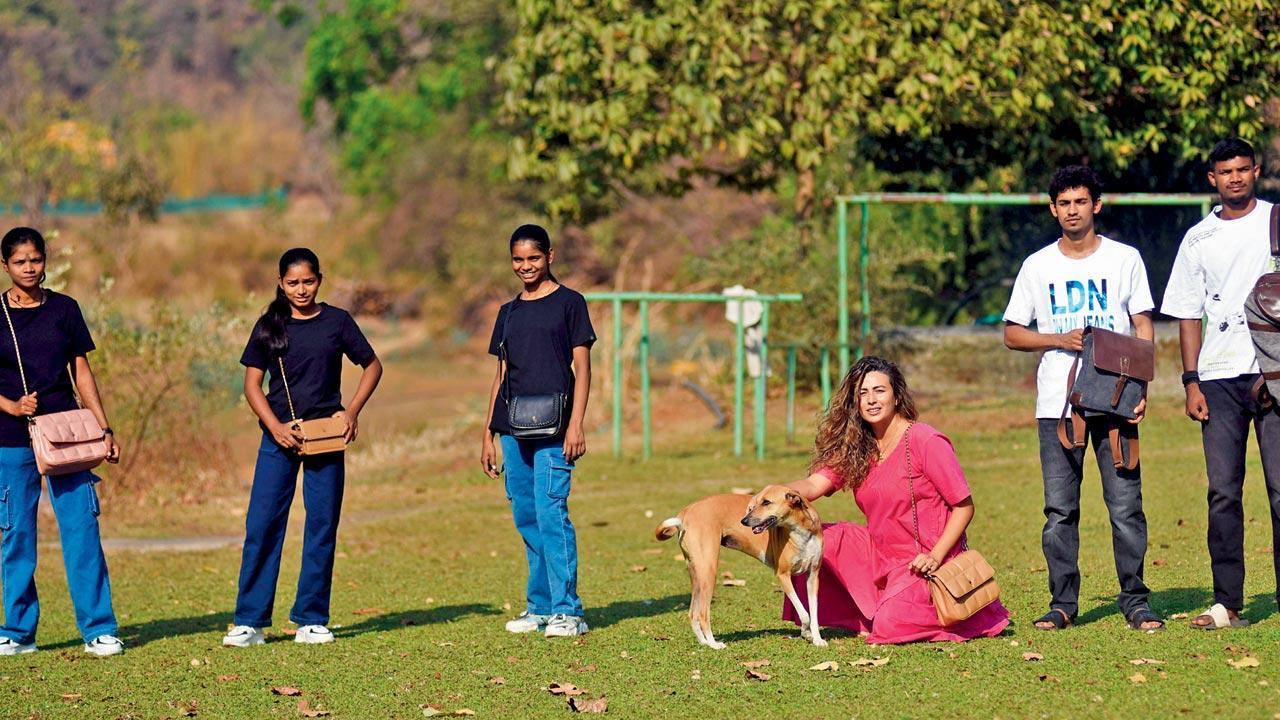Budding squash champs of Kalote-Mokashi village in Karjat model Pia Trivedi’s vegan bag line

Soniya Waghmare, Bijali Darvade, Durga Parthi, Pia Trivedi, Sadashiv Singhva, Naresh Shingva and Bouncer the Indie. Pic/Sameer Markande
This is Ritwik [Bhattacharya’s] baby, and I back and support him; and Kalote Animal Trust (KAT) is my baby, where he backs me.” And the newly born—and connecting sibling—to these two babies is Pia’s Faux. The vegan bag line’s first range was launched on Mahashivratri, March 9.
ADVERTISEMENT
The day is important: The self-designed, prominent trishul in gold hovers over the brand’s creator, model Pia Trivedi’s, feted clavicle. It’s also on the logo on the bags, sprouting from the letter P. “Powered by Shiva,” she says. We’re sitting on the terrace at START (Squash temple and rhythm training) Academy in Kalote-Mokashi village, about two hours from Mumbai, overlooking a glass squash court buzzing with sun-soaked children and teenagers. It is the brainchild of her squash champion spouse.
Close-by is KAT, founded by Sameer Vohra and co-supported by Trivedi over the years in many ways, to which now the proceeds from Pia’s Faux will flow. “I first met Sameer when he ran a shelter in Lonavala,” says Trivedi, her mane of curly hair still wearing a trademark lock of blonde. “Unlike other shelters, what stood out was that the animals roamed free, and looked healthy, whereas Sameer was always scrawny. Once I asked if I could bring some food to feed a horse, and he handed me a roti from his plate. I asked him if we could work together, if our ethics matched.”
KAT homes goats, dogs, cats, cows and bulls, and horses retired from the racecourse. Many of the large animals—even thoroughbreds with their rich shades of brown—would be headed to the leather industry. So the realisation that “you don’t have to kill an animal to make a five-lakh-rupee bag” wasn’t too far. We speak of a Balenciaga, which was a favourite, till it wasn’t; and of a millionaire matriarch with a preference for bags made from the skin of freshly-hatched crocodiles. “I never bought leather,” says the one-time VJ, “I would be gifted leather bags as a model, but never bought one.”
This line of 12 models—clutches, waist pouches, duffle bag, backpack, sling bags—are made of rexine and canvas. The viability of cactus leather is being explored for the next collection. The bags are made in a unit in Noida, and currently, only 10 pieces were made for each model. “I didn’t want to fall on my face, nor shout from the hill top,” she says, “Though larger production would mean more funds for KAT...”
The bags are modelled by the village children who self-confessedly spend “20 out of 24 hours in a day at START”. There is a concern: Fashion is accused of being tone deaf and more than one European luxury brand has been accused of fetishising poverty and indigenous people by using them as props to model the products, or as background for campaign. More notable, these are not people who would share a realm with the product otherwise.
Trivedi counters this with: “I want to give them as much exposure as possible. They had not heard of squash until START; with KAT, where many of their parents work, they know of animal-centric professions. India has such a rich variety of beauty—there is a teenager with curly hair, jawline, and a swagger that would not be out of place on an Italian runway. When I was hosting Get Gorgeous for [the music channel] Channel [V], we would scout for talent all over India. That’s what I am doing here.”'
Much of the population at Kalote-Mokashi is of the adivasi tribe Thakkar [‘yha ranachi pakharr’, birds of this forest, as the Marathi song goes], and Neo Buddhists of the Navayana sect. So how do you elevate them from mere props for fashion? We try to present them as three-dimensional human beings: 13-year-old Soniya Waghmare ranks 38 in the Under 15 category nationally; 24-year-old Bijali Darvade ranks 282 internationally, and 16 nationally, 17-year-old Durga Parthi ranks 22 in the Under 19; 21-year-old Sadashiv Singhva ranks 64 nationally in the Under 25; and 19-year-old Naresh Shingva in among the top 8 in the Under 19 category. They giggle and look at each other when we ask them their ranking.
“It doesn’t matter to them!” exclaims Tridevi in delight, “They just want to play!” A city slicker would have told you the ranking first. As they file up to model the bags, they flounder awkwardly: How does one wear a sling? Which side of the duffle bag is up? Where does the palm go? Once over,
relieved, they fly back to the court.
 Subscribe today by clicking the link and stay updated with the latest news!" Click here!
Subscribe today by clicking the link and stay updated with the latest news!" Click here!







